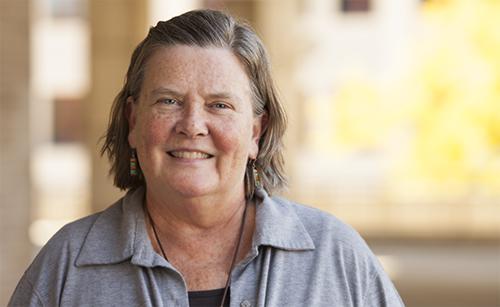Honoring Hilmes: Best. Colleague. Ever.
This is the third post in our “Honoring Hilmes” series, celebrating the career and legacy of Michele Hilmes on the occasion of her retirement.
Post by Jonathan Gray, University of Wisconsin-Madison
I sincerely hope (and expect!) that Michele Hilmes’ retirement will not be a retirement from academia, but since it will be a departure from the Department of Communication Arts, and from the Media and Cultural Studies area of the department, I’d like to comment on her as a colleague.
In doing so, I’d also like to insist that Michele has been the most important person in the cultural life of Media and Cultural Studies (MCS) at UW-Madison.
When I was hired in 2009, I was aware of this being seen as John Fiske’s program in the field at large (even though he’d retired in 2000). For all that he did, as inspirational figure, as translator of high theory, as champion of the popular, as ambassador of cultural studies to the U.S., and (by all accounts) as the guy who’d stay up past midnight discussing Gramsci with grad students in The Red Shed bar, he deserves plenty of kudos. But Michele’s own importance in building up the program and keeping it healthy was made clear when Fiske gave me advice (at the Fiske Matters conference) to follow in his foot-steps and never sit on any departmental committee other than the Graduate Committee. By contrast, Michele has been on almost every single committee in the department, from Graduate to Personnel and Tenure, Budget and Salaries to Awards, Development to Undergraduate, a Self-Study Committee to multiple search committees. She’s been Director of Undergraduate Studies, Director of Graduate Studies, Associate Chair, and Chair. At the university level, she’s chaired the Humanities Division Executive Committee, performed program reviews, been a Women’s Faculty Mentor, chaired the college’s Equity and Diversity Action Committee, and been on the Ethnic Studies Implementation Committee. All of this while performing immense service to the field at large, while sitting on countless dissertation committees, and while publishing at a remarkable rate. She’s always found time, made time, to keep the machine running, to fix it, to reinvent it, and to ensure everyone knows how to work it.
MCS hasn’t just produced an impressive slate of alumni: many of them talk glowingly of their time here. Upon arrival, I was entranced by the energy, the camaraderie, and the commitment to asking all sorts of questions, but being collegial while doing so. I’m convinced that much of this has existed because of Michele. She wasn’t the only one, of course, but she has regularly been the one behind the scenes – serving on yet another handful or five departmental committees – who has upheld it, whose leadership, example, and careful politics have allowed it to continue, to thrive. She hasn’t gotten adequate credit for this, either, precisely because of how well she does it: countless times I’ve seen her walk us away from the edge, and move us in a better, safer, kinder direction, but I’m often the only one who has seen that. She doesn’t crow about her achievements, she doesn’t boast of great victories. She has an amazing ability to care deeply, to think through exactly what the best course of action is, to enact it, and then to brush it off, spare us the need to rehash it, and leave the office as though nothing ever happened.
 She’s also regularly had to exert this leadership with few comrades-in-arms, or with an ever-changing list of colleagues. Through much of her time at Wisconsin, MCS has been short-staffed, meaning that Michele has regularly needed to walk into department meetings with nothing approaching a majority of the votes naturally on her side; she’s needed to work with others to get things done, to constantly communicate MCS’ needs and to articulate them to others’ needs so that they’re met. She’s had assistance, but each new arrival has been another person she needed to bring on-line. I’m often aware that when she calmly and expertly explains how something works to me, this must be the tenth time she’s delivered such a talk in the last decade, yet she never seems exasperated.
She’s also regularly had to exert this leadership with few comrades-in-arms, or with an ever-changing list of colleagues. Through much of her time at Wisconsin, MCS has been short-staffed, meaning that Michele has regularly needed to walk into department meetings with nothing approaching a majority of the votes naturally on her side; she’s needed to work with others to get things done, to constantly communicate MCS’ needs and to articulate them to others’ needs so that they’re met. She’s had assistance, but each new arrival has been another person she needed to bring on-line. I’m often aware that when she calmly and expertly explains how something works to me, this must be the tenth time she’s delivered such a talk in the last decade, yet she never seems exasperated.
Her other great skill as a colleague, though, and especially as a senior colleague, is that she balances perfectly being there to give advice, to instruct and educate when needed, and to explain what was done in the past and why it was done, with an eagerness to allow each new arrival to put their imprint on things. It would have been easy for Michele to draw lines in the sand, declare that “this is what MCS is, and this is what we do,” and simply require successive waves of junior faculty to fall in line, but instead during my whole time here I’ve seen her excited to help the rest of us work out what we want MCS to be, what we want the department to be.
I’m aware that this is a “gushy” post. It reads like something that perhaps I should just be saying privately to Michele. But I’m saying it publicly in part to pay testament to a remarkable leader who has made this “her” program in the best way possible, and whose credit hasn’t been duly recognized in the field at large. I’m also saying it publicly to insist that collegiality matters. We tend to think of academic ideas and approaches as founding programs (and to this end, Michele has also been a remarkable leader, as evidenced by the number of MCS alumni whose work is historicized with great care), but interpersonal approaches, a culture of kindness and respect, and a commitment to working behind the scenes to keep all the mundane cogs, wheels, and springs working – these are regularly forgotten about. Michele has been a good colleague par excellence.
As you’ll all soon have the chance to listen to, Andrew Bottomley, Jeremy Morris, and Christopher Cwynar recently put together a podcast in Michele’s honor. It includes the voices of approximately 50 scholars and former students worldwide, all of whom glow about her not just as a scholar, but as a colleague, an advisor, a mentor, a friend. Discussions of great programs often privilege masculinized notions of having public academic “fights” and “battles” with “rival” camps, of steely eyed dictatorship and an unwillingness to negotiate, and of loud and proud proclamations of one’s identity from the hilltops. The impact of Michele’s example of another, better way is made clear throughout that podcast.
I have had the distinct privilege in my career to date of working with many truly amazing people. I hope none take offense when I say that even amongst them, Michele Hilmes rises above as the best colleague I could imagine. I’ll miss you dearly, my friend.



